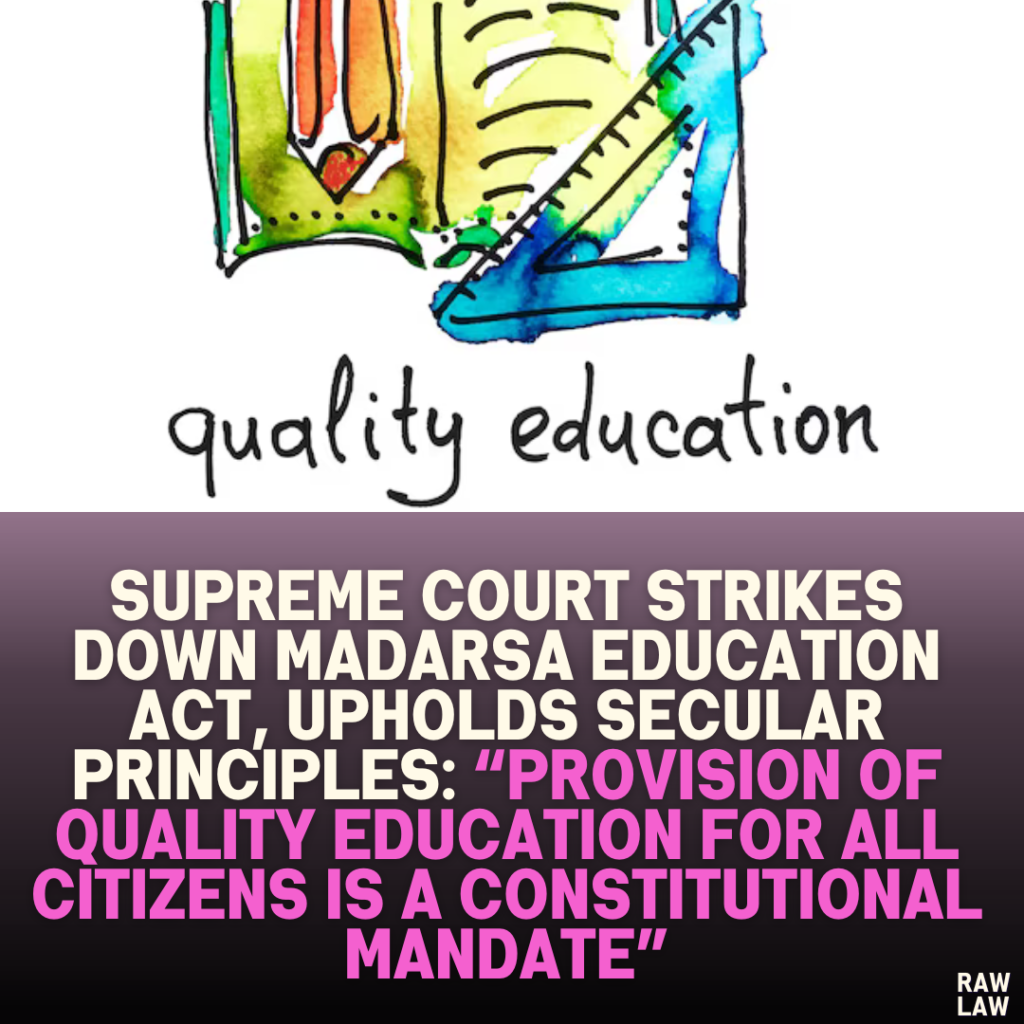Court’s Decision
The Supreme Court held that the Madarsa Education Act violates the constitutional principle of secularism and Articles 14 and 21A of the Constitution. The Act was deemed unconstitutional on the grounds that it created an imbalance by disproportionately regulating religious instruction within the educational system, thus denying students access to a secular, mainstream education and equal opportunities in employment and professional choice.
Facts
The Madarsa Education Act was enacted by the State Legislature to govern the education standards, teacher qualifications, and administration of Madarsas in Uttar Pradesh. Madarsas, traditionally focusing on religious instruction, were regulated by the Madarsa Board, a body with significant influence from religious authorities. The Act was challenged on the basis that it violated the fundamental right to secular education and equality as provided under the Constitution.
Issues
- Whether the State Legislature has the authority to enact laws regulating religious instruction in educational institutions.
- Whether the Madarsa Education Act violates the principle of secularism and fundamental rights under Articles 14, 15, 16, and 21A of the Constitution.
- If the Act constitutes permissible regulation of minority educational institutions under Article 30 of the Constitution.
Petitioner’s Arguments
The petitioners argued that the Act:
- Violates students’ rights to secular education by prioritizing religious instruction, contrary to Articles 21 and 21A, thereby depriving students of equal opportunities in education and employment.
- Creates two distinct classes of students—those with access to secular education and those restricted to religious instruction, impacting future employment and professional choices.
- Discriminates by disproportionately staffing the Madarsa Board with religious figures, skewing the curriculum toward religious studies.
- Lacks adequate standards for teacher qualifications in Madarsas, limiting educational quality and disadvantaging Madarsa students compared to those in mainstream institutions.
Respondent’s Arguments
The respondents argued that:
- The Madarsa Act is a regulatory measure aimed at preserving the educational rights of religious minorities.
- The Act ensures the educational and cultural autonomy of minorities as guaranteed by Article 30.
- Secular subjects are incorporated in the curriculum, and religious instruction is merely an added component, not in conflict with secularism.
- Striking down the Act would dismantle a well-established framework and impact over a million students in Uttar Pradesh by potentially shutting down all Madarsas in the state.
Analysis of the Law
The Supreme Court examined the legislative competence of the State under Entry 25 of List III, which allows for laws concerning education but does not include religious instruction. It emphasized that secular education is a fundamental expectation under Articles 14, 15, and 16, which promote equality and non-discrimination in public policy, including education. Additionally, the court analyzed the regulatory limits established in Article 30, which allows minority institutions certain freedoms but not at the expense of educational standards and equality.
Precedent Analysis
The Court referenced S R Bommai v. Union of India, where secularism was held as a core constitutional principle, mandating equal treatment of all religions without state interference in religious instruction. Other precedents cited included P A Inamdar v. State of Maharashtra and Ahmedabad St. Xavier’s College Society v. State of Gujarat, where the right to administer minority institutions was upheld but subjected to reasonable regulations ensuring educational standards.
Court’s Reasoning
The Supreme Court reasoned that while minority rights under Article 30 are protected, the provision of secular, quality education to all citizens is an overarching constitutional mandate. The Madarsa Act’s focus on religious instruction over secular education was found to contradict this mandate. The court observed that the constitution guarantees religious and cultural rights but does not allow for discrimination in education that may isolate or disadvantage certain groups.
Conclusion
The Supreme Court concluded that the Madarsa Education Act could not stand constitutional scrutiny as it violated secular principles and the right to equality in education. The Court ordered the State to ensure that all students in Madarsas have access to mainstream education, aligning with national education standards, and recommended a re-evaluation of the Act to align with secular educational values.
Implications
This judgment underscores the Court’s commitment to secularism in education and sets a precedent limiting the State’s power to enforce religious instruction within public education. The decision will likely prompt a review of educational policies concerning minority institutions, ensuring they comply with secular standards without compromising the constitutional rights of religious minorities.




Pingback: Bombay High Court Quashes FIR Due to Mutual Settlement, Criticizes "Copy-Paste" Allegations and Emphasizes Police's Duty to Avoid Over-Implicating Family Members in Marital Disputes - Raw Law